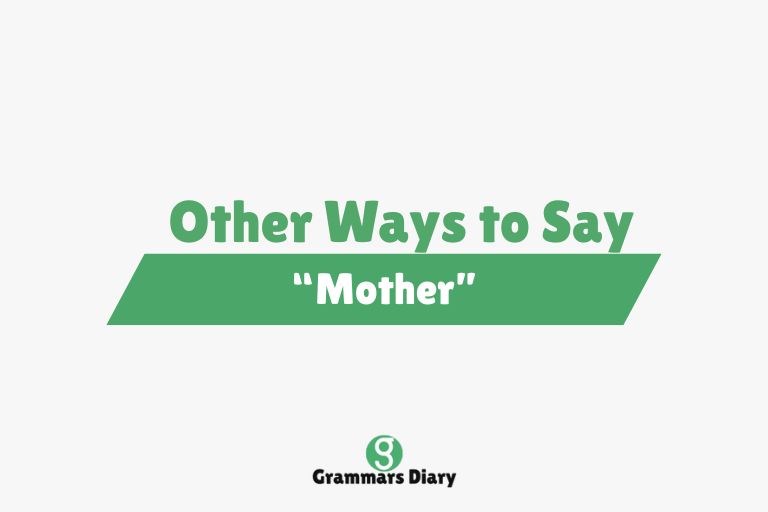The word “mother” is one of the most meaningful and universally recognized terms in every language, culture, and family structure. It often evokes warmth, care, sacrifice, and unconditional love. However, depending on the context—whether you’re writing a poem, composing a story, or speaking in a more formal, affectionate, or even humorous tone—there are numerous alternative words or expressions that can replace or enhance the term “mother” to suit your specific communication needs.
Each of these alternatives holds its own subtle meaning, historical background, and emotional weight. Whether you’re looking for a tender nickname, a respectful title, or a literary variation, this guide will walk you through a wide range of options to diversify and personalize how you refer to this deeply important figure in your life or writing.
Other Ways to Say “Mother”
1. Mom
Example: “I called my mom to tell her I landed safely.”
Meaning: A casual and affectionate term commonly used in American English to refer to one’s mother.
Usage: This is one of the most widely used alternatives in informal, everyday conversation across many English-speaking countries, especially in the United States.
2. Mum
Example: “Mum always makes the best Sunday roast.”
Meaning: The British equivalent of “mom,” equally informal and warm, often used in the UK and parts of the Commonwealth.
Usage: Perfect for personal conversations, particularly if you’re writing with a British or Australian voice.
3. Mama
Example: “Little Timmy cried out for his mama during the thunderstorm.”
Meaning: A tender and childlike expression often used by younger children or in emotional or nostalgic writing.
Usage: Common in literature and spoken language, particularly among younger children or in southern and African American dialects in the United States.
4. Ma
Example: “Ma said we had to be home before sunset.”
Meaning: A shorter, often regional or rural-sounding version of “mom” or “mama.”
Usage: Frequently found in casual conversation or storytelling with a folksy, down-to-earth tone.
5. Mother
Example: “Mother insisted that we follow tradition.”
Meaning: The most formal and traditional term, often used to denote respect, distance, or formality.
Usage: Suitable for formal writing, respectful references, and situations where emotional neutrality or gravity is required.
6. Mommy
Example: “She ran into her mommy’s arms with tears in her eyes.”
Meaning: A highly affectionate and intimate term typically used by very young children.
Usage: Best used when conveying a sense of innocence, dependency, or emotional closeness in writing or speech.
7. Mummy
Example: “Mummy, can we have pancakes for breakfast?”
Meaning: The British spelling and pronunciation of “mommy,” used by young children in the UK.
Usage: Common in British English and effective when writing from a child’s perspective or in early childhood contexts.
8. Matriarch
Example: “She was the matriarch of the family, wise and commanding.”
Meaning: A formal title given to a woman who leads a family or group, especially an older woman with authority.
Usage: Ideal for historical, genealogical, or sociological contexts where the mother figure has power and leadership.
9. Birth Mother
Example: “He found his birth mother after years of searching.”
Meaning: A biological mother, especially in the context of adoption or family history.
Usage: Often used in legal, medical, or adoptive contexts to distinguish from an adoptive or stepmother.
10. Stepmother
Example: “His stepmother welcomed him with open arms.”
Meaning: A woman who is married to one’s father but is not one’s biological mother.
Usage: Typically used in family relationship structures to clarify the nature of the maternal role.
11. Foster Mother
Example: “Her foster mother provided a stable home during difficult times.”
Meaning: A woman who cares for a child in the foster care system but is not the child’s biological or legal parent.
Usage: Common in legal, social work, or personal contexts where non-biological caregiving is emphasized with compassion and structure.
12. Godmother
Example: “My godmother has always been a guiding force in my life.”
Meaning: A woman chosen to sponsor a child during baptism and often seen as a spiritual or supportive guardian.
Usage: Typically used in religious contexts or close-knit relationships where mentorship and love are involved.
13. Queen Mother
Example: “The Queen Mother was beloved by the nation for her grace and wisdom.”
Meaning: A royal title given to the mother of a reigning monarch.
Usage: Primarily found in historical, ceremonial, or royal contexts, emphasizing status and respect.
14. Mama Bear
Example: “She became a real mama bear when her child was threatened.”
Meaning: A playful or metaphorical term that reflects a fiercely protective and nurturing mother.
Usage: Often used in casual, affectionate settings or when describing maternal strength and protectiveness.
15. Matron
Example: “The matron of the household kept everything running smoothly.”
Meaning: A mature woman, often one in a position of authority, particularly in domestic or institutional settings.
Usage: Suitable in historical or descriptive narratives emphasizing maternal roles with structure and discipline.
16. Mater
Example: “He returned home to see his dear mater after months abroad.”
Meaning: A Latin-based term for mother, still used in British public schools or formal literature.
Usage: Effective in classical, poetic, or traditional writing with a formal or academic tone.
17. Old Lady
Example: “He joked that his old lady still ran the house with an iron fist.”
Meaning: A slang term that can refer to one’s mother or wife, depending on context.
Usage: Casual, sometimes dated or humorous—should be used cautiously depending on tone and audience.
18. Caregiver
Example: “She was more than a mother—she was my lifelong caregiver.”
Meaning: Someone who provides constant physical and emotional care, often beyond just a biological role.
Usage: Useful in contexts emphasizing the nurturing, supportive side of a maternal figure, especially in healthcare or personal storytelling.
19. Life-giver
Example: “She was the life-giver who brought me into this world.”
Meaning: A poetic and symbolic way of acknowledging the role of a mother in giving birth and sustaining life.
Usage: Best suited for poetic, emotional, or literary writing that emphasizes gratitude and reverence.
20. Momager
Example: “As my momager, she handled my schedule like a pro.”
Meaning: A blend of “mom” and “manager,” popularized in celebrity culture where mothers manage their children’s careers.
Usage: Informal and trendy, ideal for modern writing that blends family dynamics with business or entertainment.
When to Use Different “Mother” Alternatives
In Formal or Ceremonial Settings
When writing or speaking in a formal, ceremonial, or institutional tone, terms like mother, matriarch, mater, or Queen Mother bring an air of dignity, tradition, and respect. These alternatives are ideal in eulogies, biographies, religious contexts, or official communications where reverence and gravitas are required.
In Casual or Affectionate Contexts
For everyday conversation or warm, personal storytelling, simpler and more affectionate words like mom, mama, mommy, mum, or even playful terms like mama bear or momager convey closeness, emotion, and familiarity without sounding stiff or overly formal.
In Literature, Poetry, or Storytelling
In creative writing, symbolism and tone play a critical role. Using expressive terms like life-giver, mater, or caregiver allows the writer to reflect deeper emotional undercurrents or unique relationships between mother and child. These words enrich the narrative while maintaining a poetic or character-driven perspective.
Conclusion
While the word “mother” itself carries immense emotional and cultural weight, the English language is rich with alternatives that capture the many layers of what it means to be a mom. From formal titles to affectionate nicknames, each variation tells a slightly different story—of nurture, protection, heritage, or even fierce independence. By choosing the right synonym for “mother” based on context, you can bring clarity, warmth, or nuance to your communication.
Whether you’re writing a heartfelt card, constructing a family tree, or simply chatting about your day, having access to these alternatives helps you say what you feel in a way that truly fits.
FAQs
What are affectionate ways to say “mother”?
Words like mom, mama, mommy, mum, and mummy are all loving, affectionate ways to say “mother” depending on regional and cultural background.
Is “matriarch” the same as “mother”?
Not exactly. A matriarch refers to a woman who leads a family or community and may or may not be a biological mother, though she often is.
Can “godmother” replace the term “mother”?
In certain spiritual or symbolic contexts, yes. A godmother may act as a guiding or secondary mother figure, especially in religious or familial ceremonies.
What is the difference between “momager” and “mother”?
A momager is a modern slang term combining mom and manager, used when a mother also manages her child’s career, especially in entertainment or business.
Is “caregiver” a respectful term for a mother?
Yes, particularly when you want to emphasize the nurturing and supportive role a mother plays beyond just biological ties. It’s both heartfelt and inclusive.











